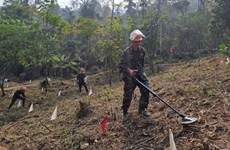Vietnam joins war on child sex tourism
Child sex tourism is not mentioned specifically in Vietnamese
legislation, but there are fears that it can be growing as the nation
makes big advances in attracting holiday makers - and as Vietnamese
themselves move more and more around the country.
Child sex tourism is not mentioned specifically in Vietnamese
legislation, but there are fears that it can be growing as the nation
makes big advances in attracting holiday makers - and as Vietnamese
themselves move more and more around the country.
Legal expert Le Thi Hoa from the Justice Ministry's Department of Criminal and Administrative Laws said that existing regulations in the penal code, child care, protection and education, anti-human trafficking and prostitution seem to cover this kind of crime.
However, she said there is a need for a legal framework directly targeting the crimes.
Child sex tourism is described as the sexual exploitation of children by a person or persons who have sexual contact with children.
Offenders can be domestic travellers or international tourists. Child sex tourism often involves the use of accommodation, transportation and other tourism-related services that facilitate contact with children and enable the perpetrator to remain fairly inconspicuous.
Figures from the Public Security Ministry show that in the last three years, more than 4,350 crimes were recorded as being committed against children.
They involved child abuse, child labour, domestic violence, but 61 percent involved sexual crimes against children.
Senior Lieutenant-Colonel Nguyen Van Trang from the ministry's Criminal Police Department said that crimes against children are increasing as family members including fathers, stepfathers and brothers became involved.
Only a few cases of sexual crimes against children committed by travelling offenders were reported each year, most were committed by foreign tourists, businesspeople and even English teachers. This may be the tip of the iceberg, authorities say.
Trang mentioned a child rape case in southern Vung Tau City in 2006. Gary Glitter, an English rock singer, was arrested for having intercourse and committing indecent acts against girls in the city, one as young as 12. The singer was sentenced to three years' imprisonment by Ba Ria-Vung Tau Province Court.
Trang said school dropouts and street children, especially those in big tourist cities such as Vung Tau, Nha Trang, Hanoi and Hai Phong are vulnerable to sex offenders.
However, he said that data on child sex crimes is not properly updated or analysed, especially offences committed by travelling offenders - either Vietnamese or foreigners.
"Due to fear of stigmatisation and negative impacts on a victim's future, their family are reluctant to report cases, making it hard to detect or investigate," Trang said.
Lindsay Buckingham, a legal consultant for the United Nations Office on Drug and Crime (UNODC), said Vietnam's legal framework provides protection for children from sexual exploitation and criminal conduct and upholds their rights as victims and witnesses.
"However, when compared with international standards, there are gaps in the current domestic legal framework relevant to child sex tourism," she said.
Buckingham said when a country cracks down on child sexual exploitation, foreign offenders are likely to move their activities to neighbouring countries with looser laws. This calls for a regional approach to the problem.
In a just completed two-day workshop titled A Legal Framework for Combating Child Sex Tourism held by the Ministry of Justice and UNODC, the first discussion on child sex tourism in Vietnam was introduced.
It is part of a four-year project called Project Childhood, introduced last year by UNODC, Interpol and World Vision in Cambodia, Laos, Thailand and Vietnam, to combat the sexual exploitation of children, particularly in the tourism sector.
Project co-ordinator Margaret Akullo said legal responses against child sex offenders must become a more important element in reversing child trafficking, abuse and sexual exploitation.
UNODC will provide technical assistance to law enforcement agencies in conducting investigations, Interpol will bring together international, national and regional investigative resources to target travelling child sex offenders.
The 7.5 million USD project has been funded by the Australian Agency for International Development (AusAID).-VNA
Legal expert Le Thi Hoa from the Justice Ministry's Department of Criminal and Administrative Laws said that existing regulations in the penal code, child care, protection and education, anti-human trafficking and prostitution seem to cover this kind of crime.
However, she said there is a need for a legal framework directly targeting the crimes.
Child sex tourism is described as the sexual exploitation of children by a person or persons who have sexual contact with children.
Offenders can be domestic travellers or international tourists. Child sex tourism often involves the use of accommodation, transportation and other tourism-related services that facilitate contact with children and enable the perpetrator to remain fairly inconspicuous.
Figures from the Public Security Ministry show that in the last three years, more than 4,350 crimes were recorded as being committed against children.
They involved child abuse, child labour, domestic violence, but 61 percent involved sexual crimes against children.
Senior Lieutenant-Colonel Nguyen Van Trang from the ministry's Criminal Police Department said that crimes against children are increasing as family members including fathers, stepfathers and brothers became involved.
Only a few cases of sexual crimes against children committed by travelling offenders were reported each year, most were committed by foreign tourists, businesspeople and even English teachers. This may be the tip of the iceberg, authorities say.
Trang mentioned a child rape case in southern Vung Tau City in 2006. Gary Glitter, an English rock singer, was arrested for having intercourse and committing indecent acts against girls in the city, one as young as 12. The singer was sentenced to three years' imprisonment by Ba Ria-Vung Tau Province Court.
Trang said school dropouts and street children, especially those in big tourist cities such as Vung Tau, Nha Trang, Hanoi and Hai Phong are vulnerable to sex offenders.
However, he said that data on child sex crimes is not properly updated or analysed, especially offences committed by travelling offenders - either Vietnamese or foreigners.
"Due to fear of stigmatisation and negative impacts on a victim's future, their family are reluctant to report cases, making it hard to detect or investigate," Trang said.
Lindsay Buckingham, a legal consultant for the United Nations Office on Drug and Crime (UNODC), said Vietnam's legal framework provides protection for children from sexual exploitation and criminal conduct and upholds their rights as victims and witnesses.
"However, when compared with international standards, there are gaps in the current domestic legal framework relevant to child sex tourism," she said.
Buckingham said when a country cracks down on child sexual exploitation, foreign offenders are likely to move their activities to neighbouring countries with looser laws. This calls for a regional approach to the problem.
In a just completed two-day workshop titled A Legal Framework for Combating Child Sex Tourism held by the Ministry of Justice and UNODC, the first discussion on child sex tourism in Vietnam was introduced.
It is part of a four-year project called Project Childhood, introduced last year by UNODC, Interpol and World Vision in Cambodia, Laos, Thailand and Vietnam, to combat the sexual exploitation of children, particularly in the tourism sector.
Project co-ordinator Margaret Akullo said legal responses against child sex offenders must become a more important element in reversing child trafficking, abuse and sexual exploitation.
UNODC will provide technical assistance to law enforcement agencies in conducting investigations, Interpol will bring together international, national and regional investigative resources to target travelling child sex offenders.
The 7.5 million USD project has been funded by the Australian Agency for International Development (AusAID).-VNA












